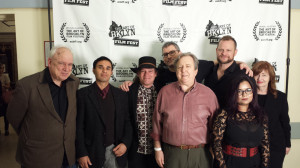
I’ve seen this happen. Genius starts a business. He’s got a great product (or film), a lot of goodwill and interest from people, and a loyal team.
What’s the first thing he does? Gets himself in hock buying or renting a LOT of stuff. Spending money (either his or his investors) on “publicity parties,” glossy packages, and a really really impressive desk. He rents an office space.
Everything’s going great, until the bottom falls out of the market, or Genius B comes out with the same product only cheaper, or your investor decides to shut the faucet off. Then Genius is left with a set of awful choices: close up shop, plow whatever’s left into finishing the film/product, change horses and make something else, lay everyone off and try to go it alone, ask everyone to take pay cuts, and so on…
In the BEST-CASE scenario, the movie gets made, the software comes on the market, the appliance ships. It does reasonably well and the company skates by, but Genius has now burned pretty much everyone around him (usually including his spouse/significant other), is in personal debt up to his eyeballs, and may have to close up and go back to work for someone else for a few years before getting another chance at-bat.
I witnessed this behavior first as a computer consultant, then as a line producer. At this point I’ve been around long enough to watch small businesses in just about every sector fail. In trying to keep my own business afloat, I’ve had to learn (sometimes the really, really hard way) how to be smart about my (and my investors’) money. This is a WAY-TOO-SHORT list of things to think about in this regard.
Limit Your Overhead
This should be obvious, but for some reason it’s not. To start making a film you need (a) a cellphone, (b) a computer, (c) a printer, (d) your brains. [obviously you need more than that as time goes on] If you need to get away from the house because it’s too distracting, find a cafe/bar/library/someplace, preferably free. Or make or buy a cheap desk and stick it in a corner of your room. Likewise, hiring people before you’re ready to use them, buying lots of gadgets (more on that below), throwing launch parties, buying expensive desks… not good uses of money.
Get Good Tools
This seems to contradict to what I just said, but not really. You will need a smartphone, a computer, a printer, and probably some piece of furniture to put them on. Fortunately, good tools aren’t always expensive. Almost any machine you buy from HP, Apple, or Dell will give you decent horsepower and all come with good warranty options. You’ll need a laser printer (but not an expensive one) if you want to print bulk copies of scripts and business plans (it’ll be cheaper than Staples or an inkjet). Most cellular plans come with decent promos for smartphones. A desk can be put together for about $50-60 in lumber or a trip to Ikea, or by salvaging a door and some filing cabinets (one of my favorite methods). A decent office chair (or better, a stool) can be gotten from Staples or Quill for cheap.
The price of buying bad tools that break or underperform is high – lost productivity due to tech support calls, cash spent on replacing items that are just out of warranty. Investors also take stock of your tools when you meet them (just as they do your clothes and hair). Appearing somewhat thrifty is good; appearing too cheap suggests that you don’t have a good gauge on when to spend money.
Renting Gadgets vs. Buying Them
If you’re a DP, a sound mixer, an editor or compositor, then your livelihood depends on having good tools (see above) and being able to use them when you want/need to. Purchasing a camera, lights, an editing system and/or DDR may make sense. But if you’re a producer, buying gadgets usually doesn’t make sense, and here’s why:
* Unless your business model includes working for hire and bringing the gear along (for a fee), or renting the camera out to other people, then your gadget will never make back its cost. When I bought a Mac to edit my first film with, I also used it as my main computer for four years; between web programming gigs, line producing and the occasional editing spot, I’m sure I was able to pay back the cost of the machine. Can you say the same thing?
* If you rent something and it breaks down, you call the rental house and they replace it – on their dime. If you buy something and it breaks down, it’s your responsibility to fix it. As a computer geek, buying a computer (vs. leasing) made sense because I could fix most problems myself. But if you’re on set and your camera dies, you’d better have a backup unit or a good relationship with a rental house.
* Are you looking at the real cost of ownership, or just the basic model price? If you’re buying a camera, did you include the tripod, carrying case, cables, spare batteries, and additional cards?
* Today’s gadget is tomorrow’s doorstop. Make sure you aren’t buying something that’s going to be outdated in a year when the next model comes along – then you won’t even be able to rent it out as frequently.
It’s often more cost-effective in the long run to rent gear when you need it. An important exception to this is documentaries, where you may have to pick up and go on a moment’s notice, or if you’re shooting somewhere way far away from a rental house for months on end (then you might as well buy, and just take really good care of your gear).
Take The Cost of Living Into Account
The cost of living – due to real or artificial inflation – goes up roughly 3% or more per year. It’s hard to measure exactly, because some goods stay the same in price while others rise.
But most people don’t take this into account. If you have a savings account that’s earning below the cost of living increase, you’re essentially losing money every year (less than if you put the money under your mattress, but still). Likewise if you go without a raise for a couple of years at your day job, you’re effectively taking a pay cut. This is also why you can’t use a budget from a film made more than a few years ago as the basis for your own (which you shouldn’t be doing anyway). El Mariachi and Blair Witch would still cost more if made today, even if NOTHING in the way they were filmed changed.
Credit Card Debt Vs. Savings
Most of the time, saving is better than spending. HOWEVER, there are exceptions. Right now, CDs are offering less interest than the rate of inflation (see above). Credit card interest, on the other hand, has not come down as much, and credit card companies are constantly finding new ways to stick it to us – late fees, interest rate jumps, new ways of calculating interest, membership fees, “rewards program” or “fraud protection” fees, etc…
If you’re putting money into a savings account (or IRA or 401K) but are also carrying credit card debt, STOP saving and pay down your debt first. Start with the highest-interest cards first, and “snowball” your payments (as you pay one card off, apply the payment to the next card).
Don’t pay your taxes on your credit card. The IRS will take monthly payments, and the interest and penalties charged are usually far less than the credit card companies will charge you in interest.
Don’t put staple goods on your credit card – food, gas, etc. – unless you can pay it off every month or you’re using a debit card. If you can’t pay for your food in cash, that’s a sign that you’re living above your means.
Don’t buy into fraud protection insurance or any of the other crappy insurance programs offered by credit cards. They add very little value to the protection built into your account (and enforced by law). Likewise, be wary of rewards programs – they tend to encourage spending.
I’m all for having a little rainy-day fund in case you get laid off. But nothing will eat into that fund faster than debt, so I still think it’s better to pay the debt off first and save later.
Get Organized
If your car ashtray or shoebox is your bookkeeping system, you need to upgrade to something better. If you have investors, they will sometimes ask you how things are going with their money, and you’d better be able to answer.
I recommend learning QuickBooks. It’s hard to get a reliable, good bookkeeper for what you can probably afford to pay (which is usually next to nothing). It’s not an easy program to learn, but once you do you’ll be working with the industry standard. You can budget and track expenses, add credit cards as well as bank accounts, and generate statements and invoices.
Keep Your Money Separate…
… from your investors’. It’s VERY tempting to use investor money for personal use. Maybe you think you deserved a dinner on the company’s dime because you worked late. Or you think you should lease a car. Or have the company pay part of the rent on your apartment (since it’s the production office anyway).
There is a legitimate case to be made for each situation. If you’re in preproduction and you’re saving money because you didn’t have to hire a PA to collate all those scripts, then having dinner makes sense. If you’re in production and your shitbox isn’t big or reliable enough to transport your actors and crew, you should rent a vehicle. If your production office is your apartment, you may need to reimburse yourself a little (at least to cover bumps in utilities, furniture breakage, and/or spousal irritation).
But if you’re in development or postproduction, these arguments don’t really hold up as well. If you’re in development you should be saving as much money as possible; if you’re in post you’re probably coming close to running out of it. Your investors may or may not scrutinize these expenses. If they think you’re using their money as a “free ride” they may not be as generous the next time around. Or they might want some of it back.
Auto Pay Is The Way
Especially when you’re in production, you really don’t have time to keep track of your personal finances. Many of us (myself included) hate doing it in the first place. So I get the bank to some of it for me – I have my bank account automatically pay all my bills. I have an overdraft on the checking account so I’m not worried about a bounced check. Since doing this my late payment fees have dropped to about $15 per year; also, my interest rate increases (due to late payments) have disappeared. The few times I’ve had a shortfall – when a payment has come out of the overdraft because my paycheck hadn’t cleared – the charge was nominal. At the very least, turn this option on during production.
Don’t Let Out Of Pocket Expenses Accumulate
Your first instinct will probably be to let the crew pay for their expenses, then reimburse them after they submit receipts. After all, there’s always the chance that if you hand them their money, they’ll just walk away with it, right?
The truth is that most people won’t do that. They want to work again. The short-term gain is too small. They have pride in their work.
The solutions are to give them floats, give them credit cards with specific limits, and/or pay for certain expenses directly. Review their spending on a weekly basis and stay on top of things (or hire a line producer to do it).
If you give your department heads piles of cash and say “that’s all you’re getting,” they will spend that pile. If you tell them you’ll reimburse them later, they’ll spend more than that pile, and be upset if you say that you won’t reimburse them for everything. This is not evil on their part – they’re just trying to help you make your movie, and are often going above and beyond to do that. But people don’t tend to keep as close track of their own spending, or they just assume that you’ll cover it anyway, or maybe they’re a little pissed because they’re going out of pocket… for a variety of reasons, you’ll end up spending more.
Think Opposite The Herd
When everyone sells, that’s when it’s time to buy. When everyone’s buying, that’s when it’s time to sell. That’s the best way to survive in the world of investing.
This principle applies to filmmaking in general, however. Make a film in the winter (when no one is working), shoot in a town where no one else goes, pick atypical locations, cast under-utilized actors… you get the idea. If everyone is shooting a romantic comedy, maybe you should put yours on the shelf and take down that horror film – otherwise, you’ll end up with just one more low budget romantic comedy, aiming for the same jackpot your competitors are.
Student Loan Consolidation? Think Carefully…
Consolidating your student loans may lower your immediate overhead, but it will usually cost you more in the long run. The consolidated interest rate can often be higher than at least some of the individual loans. And of course you’ll end up paying more in interest over the long haul (sometimes three times as much). Some of your loans (particularly certain types of Federal loans) aren’t “consolidatable” in any case.
Hire Good Professionals
You’ll need a good lawyer and a good tax accountant (unless you’re skilled in either of these areas). Build their services into the film’s budget. I’ve seen far too many people get into trouble because they wrote their own (badly worded) contract, or filed the wrong LLC forms at tax time or when forming the corporation.
Pay Yourself Last
Yes, everyone says “pay yourself first,” but if you’re making a low-budget film, your crew really aren’t going to understand why they’re working deferred or at a low rate if you’re getting a better deal. If you want people to be loyal to you, it’s better to forgo some perks (a fancier desk, a better salary, early-day Fridays) and work your ass off.
People Are Your Best Resource
You don’t have to suck up or even be particularly nice to the people working for you, but you do have to publicly acknowledge that their contribution is valuable. This doesn’t always mean spending a lot of money – sometimes a sincere “thank you” or a drink, or hiring them on your next better-paying job, are sufficient. You can’t buy people’s loyalty and trust, you have to earn it through your deeds.
Well, that’s it – really truly. Time to get back to rewriting.
 One of the highlights of the year for us: screening at the Art of Brooklyn Film Festival, where we won Best Feature Film!
One of the highlights of the year for us: screening at the Art of Brooklyn Film Festival, where we won Best Feature Film!


